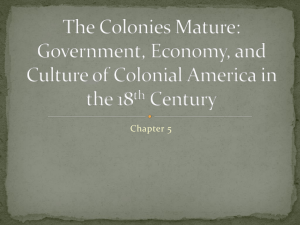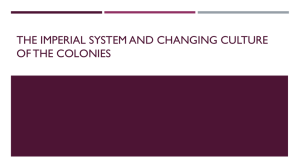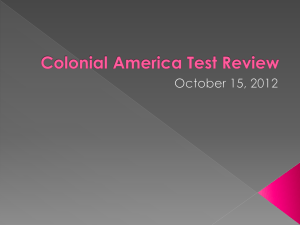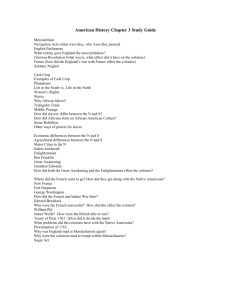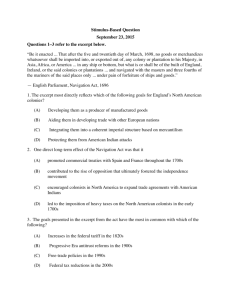Document
advertisement
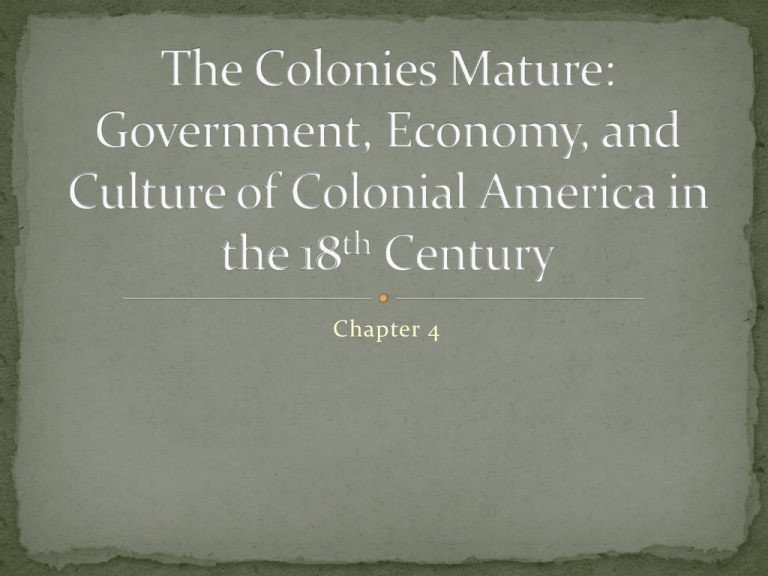
Chapter 4 3 types of colonies: Corporate, Royal, Proprietary Corporate/self governing=company/group of people (Virginia / Massachusetts for a while) Royal=owned by the king (New York) Proprietary=belonged to one individual (PA) All colonies had representative government (House of Burgesses 1619) Assembly elected by the people—controlled taxes made most laws Governor/Upper house appointed by the King—ran day to day affairs of colony represented the King (assembly controlled their salary) Backcountry=area away from the coast (the frontier) Poorer people, less settled, more of a mix of Indian and European Felt slighted by the elites close to the coast (Bacon’s Rebellion) Trade: Shipping centered in New England All the colonies participated in trade (Atlantic Economy) Trade between colonies and England and other European countries Trade between colonies and Africa/Caribbean (triangle trade) Mercantilism: The amount of gold in the world is essentially fixed A nation increases its power by increasing its stockpiles of gold Gold is increased by minimizing imports (buying) and maximizing exports (selling) Colonies=way to supply raw materials without sending gold to a foreign country & buy English products Mercantilist Policies—make sure that trade involving America benefitted England Navigation Acts of 1650—all trade had to be conducted on English (or American) vessels Navigation Acts of 1660—Ship crews had to be ¾ English (or American) certain products (tobacco, sugar, etc) could only be shipped to England Navigation Acts of 1663—Certain goods that were being shipped to the colonies from other countries had to be shipped to England first Navigation Acts accepted in theory (English had a right to pass them) but defied in practice (smuggling) by the colonists Efforts to stop smuggling would lead to problems. . . . Enlightenment occurring in Europe beginning in the late 1600’s, active in the colonies as well Applied reason and logic to political world Major political thinkers Hobbes—state of nature Locke—contract theory of government, natural rights Voltaire—religious toleration Montesquieu—three branches of government Rousseau—social contract (democracy, sort of) Reason and logic will be applied to almost every aspect of society—including religion Problems for religion in the 18th century Religion was once king, not so much by the 1700’s Materialism wore away at religious devotion Salem Witch Trials Half-Way Covenant Enlightenment led people to become even less devoted Deism—belief in God, but don’t believe in any one particular religion, God doesn’t take an active role in the daily happenings of the world (watchmaker God) Stage was set for a religious revival: Great Awakening Major religious revival Began in New England Jonathan Edwards, “Sinners in the Hands of an Angry God” George Whitefield More emotional than previous religious movements Reaction to the intellectualism of the enlightenment Big boost for more evangelical churches Baptists Colony-wide movement—helped set the stage for the Revolution????? New England—each town had to have an elementary school (teach kids how to read the Bible) No public education in the South Most colleges affiliated with religious groups (train ministers) Harvard/Yale—congregational Brown—Baptist William and Mary—Anglican Dartmouth—missionary school for Indians Princeton—Presbyterian Penn—non-religious Rutgers—Dutch Reformed By the mid 1700’s only about half of the colonists in British North America were of British descent English-49% African-19% Scottish-7% German-7% Scots-Irish-5% Irish-3% Dutch-3% Other European-9% Were the colonists beginning to view themselves as Americans rather than British? How could this help lead to revolution? What type of events help to lead to a sense of national identity, have you seen any in this lecture?
